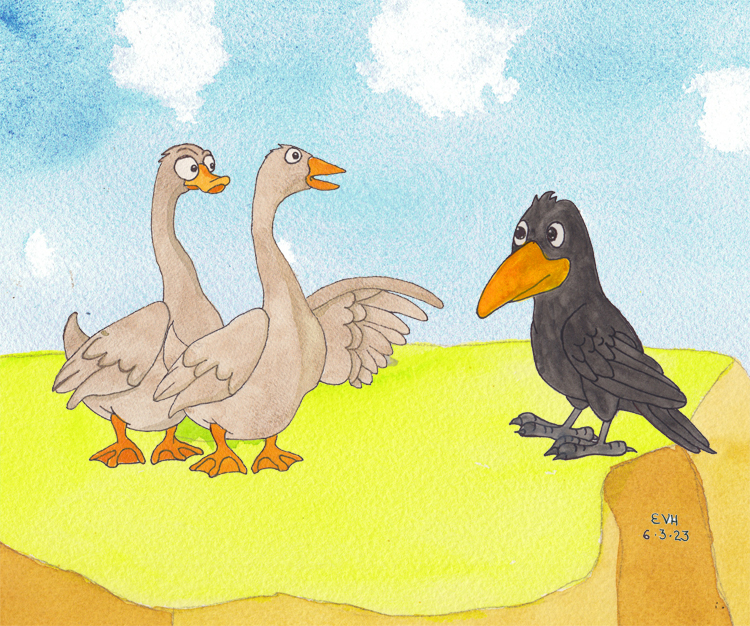
Jataka 434
Cakkavāka Jātaka
The Ruddy Goose
as told by Eric Van Horn
originally translated by H.T. Francis and R.A. Neil, Cambridge University
originally edited by Professor Edward Byles Cowell, Cambridge University
This is a cute little tale with a distinctly vegetarian overtone.
Over the years I have endured criticism for being a vegetarian, and I have always found that curious. For one thing, I never talk about it unless it is necessary. I don’t wave it in front of people’s faces, and I’m not sure why anyone should care what I choose to eat. But I think clearly some people feel threatened by vegetarianism. I think that deep down those people must feel that there is something wrong with eating meat and the suffering that comes from that. It is something worth considering.
“Twin pair of birds.” The Master told this story while he was at Jetavana. It is about a greedy monk. He was, it was said, greedy for the Buddhist requisites (clothing, shelter, medicine, and food), and casting off all the requirements of a dutiful monk, he would enter Sāvatthi quite early for alms rounds. And after drinking excellent rice-gruel served with many tasty foods in the house of Visākhā (a wealthy benefactor of the Buddha), and after eating in the daytime (outside of the permitted time for eating) various delicacies, meat, and boiled rice, still not satisfied, he would then go to the house of Culla-Anāthapiṇḍika (another of the Buddha’s wealthy benefactors) and the King of Kosala, and various others. So one day a discussion started in the Dharma Hall about his greediness. When the Master heard what they were discussing, he sent for that monk and asked him if it were true that he was greedy. And when he said “Yes,” the Master asked, “Why, brother, are you greedy? In the past, too, through your greediness and not being satisfied with the dead bodies of elephants, you left Benares and wandered about on the bank of the Ganges, entering into the Himālaya country.” And then he told this story from the past.
Once upon a time when Brahmadatta was reigning in Benares, a greedy crow went about eating the bodies of dead elephants. Not being satisfied with them he thought, “I will eat the fat of fish on the bank of the Ganges.” And after staying a few days there eating dead fish, he went into the Himālaya and lived on various kinds of wild fruits. Coming to a large lotus tank full of fish and turtles, he saw there two golden-colored geese who lived on the sevāla plant (moss). He thought, “These birds are very beautiful and well-favored. Their food must be delightful. I will ask them what it is, and by eating the same food I, too, shall become a golden color.” So he went to them, and after the usual kindly greetings to them, as they sat perched on the end of a bough, he spoke the first stanza in connection with their praises:
Twin pair of birds in yellow dressed,
So joyous roaming to and fro,
What kind of birds do men love best?
This is what I would like to know.
The ruddy goose on hearing this spoke the second stanza:
O bird, of human kind the pest,
We above other birds are blest.
All lands with our “devotion” ring
And men and birds our praises sing.
Know then that ruddy geese are we,
And fearless wander o’er the sea.
(The “ruddy goose” in Hindu lore is the turtle dove.)
Hearing this the crow spoke the third stanza:
What fruits upon the sea abound,
And where may flesh for geese be found?
Say on what heavenly food you live,
Such beauty and such strength to give.
Then the ruddy goose spoke the fourth stanza:
No fruits are on the sea to eat,
And where should ruddy geese have meat?
Sevāla plant, stripped of its skin,
Yields food without a taint of sin.
Then the crow spoke two stanzas:
I like not, goose, the words you use,
I once believed the food we choose
To nourish us, ought to agree
With what our outward form might be.
But now I doubt it, for I eat
Rice, salt, and oil, and fruit, and meat.
As heroes feast returned from fight,
So I, too, in good cheer delight.
But though I live on dainty fare,
My looks with yours may not compare.
Then the ruddy goose told the reason why the crow failed to attain to personal beauty, while he himself attained to it, and he spoke the remaining stanzas:
Not satisfied with fruit, or garbage found
Within the precincts of the charnel ground,
The greedy crow pursues in wanton flight
The casual prey that tempts his appetite.
But all that thus shall work their wicked will,
And for their pleasure harmless creatures kill,
Upbraided by their conscience pine away,
And see their strength and comeliness decay.
So happy beings that no creatures harm
In form gain vigor and in looks a charm,
For beauty surely be it understood
Depends not wholly on the kind of food.

Figure: The lesson is lost on the clueless crow
Thus did the ruddy goose in many ways reproach the crow. And the crow having brought this reproach upon himself said, “I want not your beauty.” And with a cry of "Caw, Caw," he flew away.
The Master, his lesson ended, taught the Four Noble Truths, at the conclusion of which the greedy monk attained to fruition of the Second Path (once-returner). Then he identified the birth: “In those days the crow was the greedy monk, the female goose was the mother of Rāhula, and I was the male goose.”
